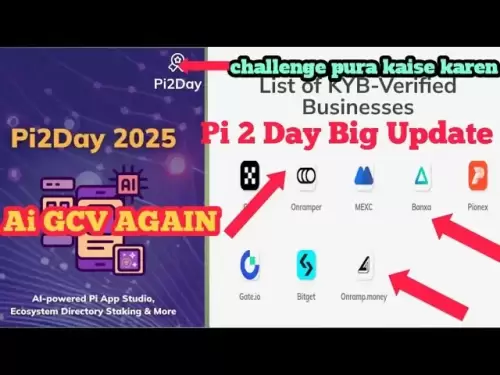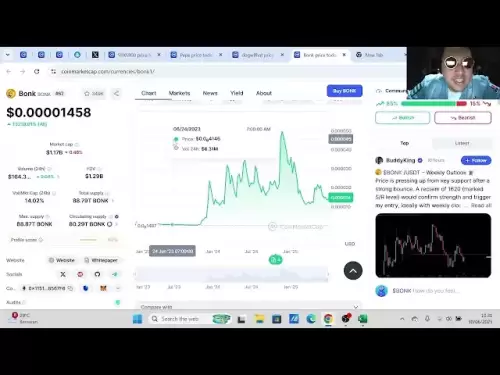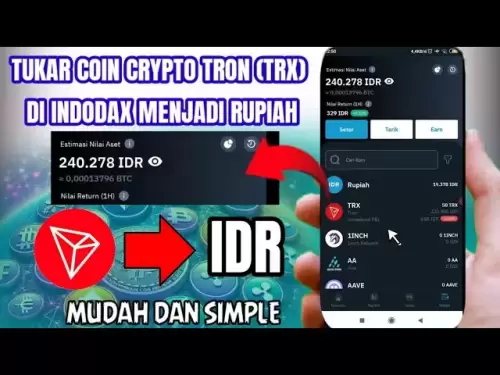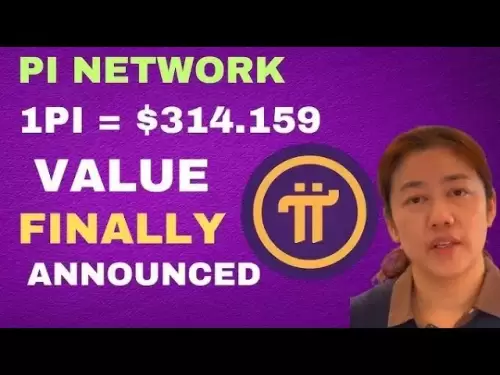-
 Bitcoin
Bitcoin $108,489.6704
1.13% -
 Ethereum
Ethereum $2,502.0528
2.92% -
 Tether USDt
Tether USDt $1.0002
0.00% -
 XRP
XRP $2.1941
0.51% -
 BNB
BNB $655.3375
1.00% -
 Solana
Solana $151.5977
1.27% -
 USDC
USDC $0.9999
0.00% -
 TRON
TRON $0.2768
0.32% -
 Dogecoin
Dogecoin $0.1676
2.86% -
 Cardano
Cardano $0.5675
0.98% -
 Hyperliquid
Hyperliquid $40.6109
7.48% -
 Bitcoin Cash
Bitcoin Cash $500.7746
2.09% -
 Sui
Sui $2.8328
2.03% -
 Chainlink
Chainlink $13.4452
1.26% -
 UNUS SED LEO
UNUS SED LEO $9.1623
0.39% -
 Avalanche
Avalanche $18.2267
2.24% -
 Stellar
Stellar $0.2382
0.00% -
 Toncoin
Toncoin $2.8885
1.68% -
 Shiba Inu
Shiba Inu $0.0...01159
0.91% -
 Litecoin
Litecoin $87.1827
0.88% -
 Hedera
Hedera $0.1511
2.90% -
 Monero
Monero $315.4992
-0.59% -
 Polkadot
Polkadot $3.4663
2.34% -
 Bitget Token
Bitget Token $4.6118
-0.65% -
 Dai
Dai $1.0000
-0.01% -
 Ethena USDe
Ethena USDe $1.0003
0.02% -
 Uniswap
Uniswap $7.2989
4.69% -
 Pepe
Pepe $0.0...01003
5.73% -
 Aave
Aave $275.5616
7.15% -
 Pi
Pi $0.5181
-2.49%
How to operate Maker (MKR) block trading? Do I need to contact the exchange?
To execute a block trade for MKR, contact the exchange's OTC desk to negotiate terms and minimize market impact due to the token's low liquidity.
May 05, 2025 at 11:28 pm
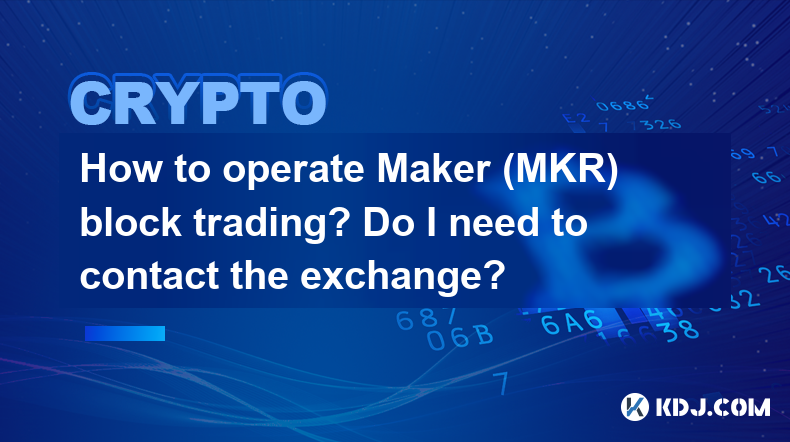
How to operate Maker (MKR) block trading? Do I need to contact the exchange?
Block trading in the context of cryptocurrencies like Maker (MKR) involves executing large trades outside of the public order book to minimize market impact. This article will guide you through the process of block trading MKR and whether you need to contact the exchange.
Understanding Block Trading
Block trading is typically used by institutional investors or high-net-worth individuals to buy or sell large quantities of assets without causing significant price fluctuations. In the case of Maker (MKR), block trades can be crucial due to the token's relatively low liquidity compared to more mainstream cryptocurrencies.
Choosing the Right Exchange
Not all exchanges support block trading for MKR. Some of the exchanges that may offer this service include Binance, Coinbase Pro, and Kraken. It's essential to check the specific offerings of each exchange, as their capabilities and requirements may vary.
Contacting the Exchange
Yes, you will need to contact the exchange to initiate a block trade. This is because block trades are not executed through the standard trading interface. Instead, they are often handled by the exchange's over-the-counter (OTC) desk or through a dedicated institutional trading platform.
- Navigate to the exchange's website and look for a section labeled 'Institutional Trading' or 'OTC Desk'.
- Fill out the contact form or use the provided contact details to reach out to the OTC desk.
- Provide details about the size of the MKR trade you wish to execute.
Negotiating the Trade
Once you've contacted the exchange, you will enter into negotiations with the OTC desk. This process involves discussing the price, the size of the trade, and any other terms that need to be agreed upon.
- The OTC desk will provide a quote based on current market conditions and the size of your order.
- You can negotiate the price if you believe it does not reflect the current market value or if you have a different price in mind.
- Once both parties agree on the terms, the trade can be executed.
Executing the Trade
After finalizing the terms, the exchange will facilitate the execution of the block trade. This process typically involves transferring the agreed-upon amount of MKR to your account or vice versa, depending on whether you are buying or selling.
- The exchange will handle the transfer of MKR tokens securely.
- You will receive a confirmation once the trade is complete.
Settlement and Fees
Block trades often have different fee structures compared to regular trades. It's important to understand the fees associated with the block trade before proceeding.
- The exchange will provide you with a breakdown of the fees.
- These fees may include a percentage of the trade value or a flat fee.
- Settlement of the trade may occur immediately or within a specified timeframe, depending on the exchange's policies.
Monitoring and Compliance
After executing a block trade, it's crucial to monitor your transaction to ensure everything goes smoothly. Additionally, ensure that you comply with any regulatory requirements related to large trades.
- Keep an eye on your account to confirm the MKR tokens have been credited or debited as expected.
- Review any documentation provided by the exchange to ensure all terms of the trade have been met.
- Be aware of any reporting requirements, especially if you are trading on behalf of an institution.
Frequently Asked Questions
1. Can I execute a block trade for MKR on any cryptocurrency exchange?
No, not all exchanges support block trading for MKR. You need to check with specific exchanges like Binance, Coinbase Pro, or Kraken to see if they offer this service.
2. How long does it typically take to execute a block trade for MKR?
The time can vary depending on the exchange and the size of the trade. It can range from immediate execution to a few hours or even days in some cases.
3. Are there any minimum trade sizes for MKR block trading?
Yes, exchanges typically have minimum trade sizes for block trades. These can vary, so you should contact the exchange to find out their specific requirements.
4. What happens if the market moves significantly after I've agreed to a block trade price?
Once the terms of a block trade are agreed upon, the trade is usually executed at the agreed price, regardless of market movements. However, it's important to discuss this with the OTC desk to understand their policy on price protection.
Disclaimer:info@kdj.com
The information provided is not trading advice. kdj.com does not assume any responsibility for any investments made based on the information provided in this article. Cryptocurrencies are highly volatile and it is highly recommended that you invest with caution after thorough research!
If you believe that the content used on this website infringes your copyright, please contact us immediately (info@kdj.com) and we will delete it promptly.
- Bitcoin's Bumpy Ride: Profit-Taking Slows Momentum, What's Next?
- 2025-06-30 20:30:11
- Bitcoin's Price Stall: Decoding the ETF Inflows Mystery
- 2025-06-30 20:30:11
- Ripple XRP, Bitcoin, and Solaris Presale: What's the Buzz?
- 2025-06-30 18:50:11
- SpaceX, Mirror Tokens, and Investors: A Wild Ride to the Future?
- 2025-06-30 19:10:22
- Arbitrum (ARB) and Robinhood: Partnership Rumors Fuel Price Surge to $0.4289?
- 2025-06-30 19:10:22
- Jasmy Coin, Bitcoin, and the Rise of Solaris Presale: What's the Buzz?
- 2025-06-30 18:30:12
Related knowledge

How to customize USDT TRC20 mining fees? Flexible adjustment tutorial
Jun 13,2025 at 01:42am
Understanding USDT TRC20 Mining FeesMining fees on the TRON (TRC20) network are essential for processing transactions. Unlike Bitcoin or Ethereum, where miners directly validate transactions, TRON uses a delegated proof-of-stake (DPoS) mechanism. However, users still need to pay bandwidth and energy fees, which are collectively referred to as 'mining fe...

USDT TRC20 transaction is stuck? Solution summary
Jun 14,2025 at 11:15pm
Understanding USDT TRC20 TransactionsWhen users mention that a USDT TRC20 transaction is stuck, they typically refer to a situation where the transfer of Tether (USDT) on the TRON blockchain has not been confirmed for an extended period. This issue may arise due to various reasons such as network congestion, insufficient transaction fees, or wallet-rela...

How to cancel USDT TRC20 unconfirmed transactions? Operation guide
Jun 13,2025 at 11:01pm
Understanding USDT TRC20 Unconfirmed TransactionsWhen dealing with USDT TRC20 transactions, it’s crucial to understand what an unconfirmed transaction means. An unconfirmed transaction is one that has been broadcasted to the blockchain network but hasn’t yet been included in a block. This typically occurs due to low transaction fees or network congestio...

How to check USDT TRC20 balance? Introduction to multiple query methods
Jun 21,2025 at 02:42am
Understanding USDT TRC20 and Its ImportanceUSDT (Tether) is one of the most widely used stablecoins in the cryptocurrency market. It exists on multiple blockchain networks, including TRC20, which operates on the Tron (TRX) network. Checking your USDT TRC20 balance accurately is crucial for users who hold or transact with this asset. Whether you're sendi...

What to do if USDT TRC20 transfers are congested? Speed up trading skills
Jun 13,2025 at 09:56am
Understanding USDT TRC20 Transfer CongestionWhen transferring USDT TRC20, users may occasionally experience delays or congestion. This typically occurs due to network overload on the TRON blockchain, which hosts the TRC20 version of Tether. Unlike the ERC20 variant (which runs on Ethereum), TRC20 transactions are generally faster and cheaper, but during...

The relationship between USDT TRC20 and TRON chain: technical background analysis
Jun 12,2025 at 01:28pm
What is USDT TRC20?USDT TRC20 refers to the Tether (USDT) token issued on the TRON blockchain using the TRC-20 standard. Unlike the more commonly known ERC-20 version of USDT (which runs on Ethereum), the TRC-20 variant leverages the TRON network's infrastructure for faster and cheaper transactions. The emergence of this version came as part of Tether’s...

How to customize USDT TRC20 mining fees? Flexible adjustment tutorial
Jun 13,2025 at 01:42am
Understanding USDT TRC20 Mining FeesMining fees on the TRON (TRC20) network are essential for processing transactions. Unlike Bitcoin or Ethereum, where miners directly validate transactions, TRON uses a delegated proof-of-stake (DPoS) mechanism. However, users still need to pay bandwidth and energy fees, which are collectively referred to as 'mining fe...

USDT TRC20 transaction is stuck? Solution summary
Jun 14,2025 at 11:15pm
Understanding USDT TRC20 TransactionsWhen users mention that a USDT TRC20 transaction is stuck, they typically refer to a situation where the transfer of Tether (USDT) on the TRON blockchain has not been confirmed for an extended period. This issue may arise due to various reasons such as network congestion, insufficient transaction fees, or wallet-rela...

How to cancel USDT TRC20 unconfirmed transactions? Operation guide
Jun 13,2025 at 11:01pm
Understanding USDT TRC20 Unconfirmed TransactionsWhen dealing with USDT TRC20 transactions, it’s crucial to understand what an unconfirmed transaction means. An unconfirmed transaction is one that has been broadcasted to the blockchain network but hasn’t yet been included in a block. This typically occurs due to low transaction fees or network congestio...

How to check USDT TRC20 balance? Introduction to multiple query methods
Jun 21,2025 at 02:42am
Understanding USDT TRC20 and Its ImportanceUSDT (Tether) is one of the most widely used stablecoins in the cryptocurrency market. It exists on multiple blockchain networks, including TRC20, which operates on the Tron (TRX) network. Checking your USDT TRC20 balance accurately is crucial for users who hold or transact with this asset. Whether you're sendi...

What to do if USDT TRC20 transfers are congested? Speed up trading skills
Jun 13,2025 at 09:56am
Understanding USDT TRC20 Transfer CongestionWhen transferring USDT TRC20, users may occasionally experience delays or congestion. This typically occurs due to network overload on the TRON blockchain, which hosts the TRC20 version of Tether. Unlike the ERC20 variant (which runs on Ethereum), TRC20 transactions are generally faster and cheaper, but during...

The relationship between USDT TRC20 and TRON chain: technical background analysis
Jun 12,2025 at 01:28pm
What is USDT TRC20?USDT TRC20 refers to the Tether (USDT) token issued on the TRON blockchain using the TRC-20 standard. Unlike the more commonly known ERC-20 version of USDT (which runs on Ethereum), the TRC-20 variant leverages the TRON network's infrastructure for faster and cheaper transactions. The emergence of this version came as part of Tether’s...
See all articles





















